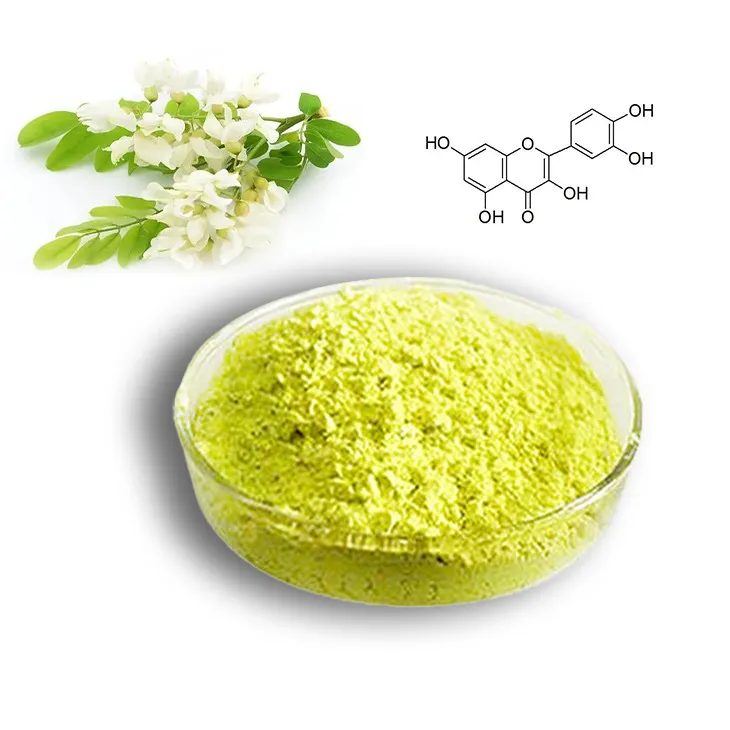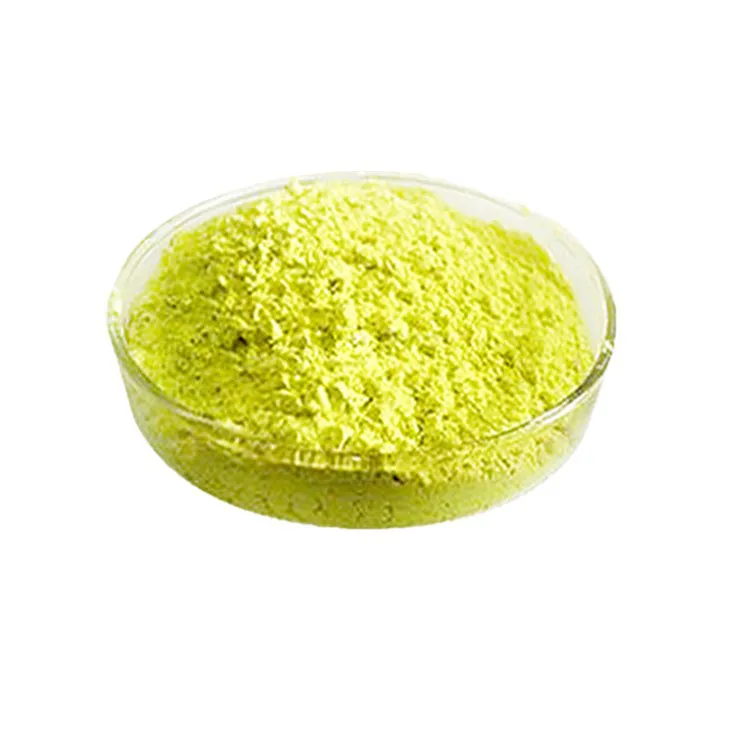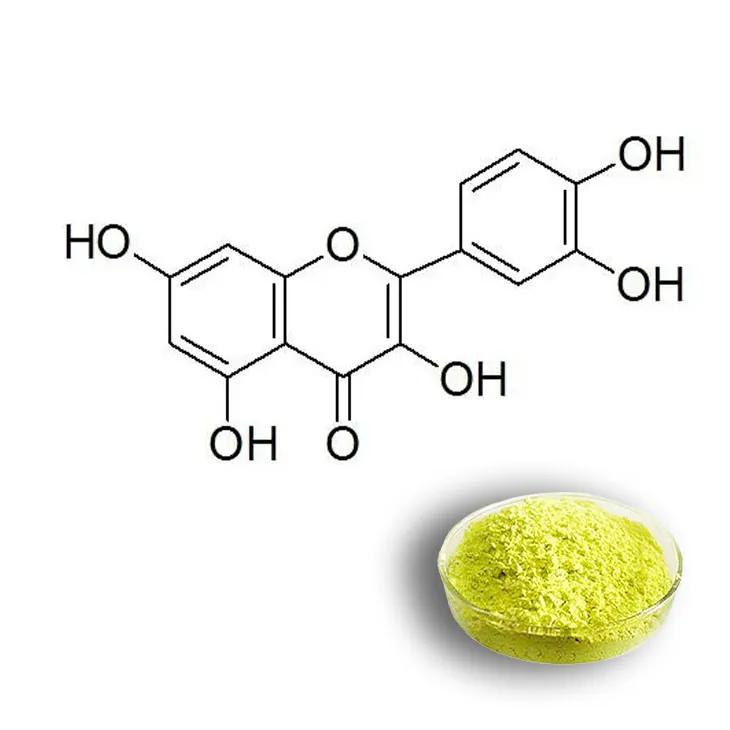- 0086-571-85302990
- sales@greenskybio.com
Quercetin: Nature's Best - Kept Secret.
2024-11-12

Introduction to Quercetin
Quercetin is a remarkable flavonoid compound that is naturally found in plants. It belongs to a group of plant - derived substances known for their diverse biological activities. Flavonoids, in general, are widely distributed in the plant kingdom, and Quercetin is one of the most abundant and important members of this family.

Quercetin as an Antioxidant
One of the most significant properties of quercetin is its role as a powerful antioxidant. In the human body, there are constantly free radicals being generated. These free radicals are highly reactive molecules that can cause cellular damage. They are formed as a result of normal metabolic processes, as well as exposure to environmental factors such as pollution, radiation, and certain chemicals.
Quercetin is capable of scavenging these harmful free radicals. It does this by donating an electron to the free radical, thereby neutralizing its reactivity. This antioxidant activity is crucial for maintaining the integrity of cells. By preventing free - radical - induced damage, quercetin helps to protect the body's cells from various forms of harm.
Moreover, this antioxidant property of quercetin is closely linked to its ability to slow down the aging process. As cells are continuously exposed to free radicals over time, they can accumulate damage, which is one of the main factors contributing to aging. By reducing free - radical damage, quercetin may play a role in keeping cells healthier for longer, thus potentially delaying the onset of age - related changes in the body.

Quercetin in Plant Ecology
From an ecological perspective, quercetin plays a vital role in plants' defense mechanisms. Plants are constantly under threat from pests and diseases. Quercetin serves as a natural defense compound in plants.
When plants are attacked by pests, quercetin can act in several ways to protect the plant. For example, it can have a deterrent effect on pests, making the plant less palatable or even toxic to them. Some pests may be deterred from feeding on plants that contain high levels of quercetin. Additionally, quercetin can also play a role in enhancing the plant's immune response to diseases. It can stimulate the plant's own defense systems, helping it to better resist the invasion of pathogens such as fungi and bacteria.

Quercetin and Human Respiratory Health
When it comes to human health, quercetin has shown potential benefits, especially in relation to the respiratory system. The respiratory system is constantly exposed to various environmental factors, including pollutants, allergens, and infectious agents. These exposures can lead to respiratory disorders and symptoms.
Quercetin may enhance the function of the respiratory system in several ways. It has been shown to have anti - inflammatory properties within the respiratory tract. Inflammation is a common factor in many respiratory diseases, such as asthma and chronic obstructive pulmonary disease (COPD). By reducing inflammation, quercetin can potentially relieve symptoms and improve the overall function of the respiratory system.
Studies have also associated quercetin with reduced symptoms in some respiratory disorders. For example, in cases of allergic rhinitis, which is characterized by nasal congestion, sneezing, and itching, quercetin may help to alleviate these symptoms. It may work by modulating the immune response to allergens, preventing an over - exuberant immune reaction that leads to the characteristic symptoms of allergic rhinitis.

Quercetin: A Hidden Gem
Despite its numerous potential benefits, quercetin remains relatively low - profile compared to other nutrients. It is often overlooked in discussions about health - promoting substances. There are several reasons for this.
One reason is that it is not as well - known as some other vitamins or minerals. For example, vitamins like vitamin C and minerals like calcium are widely promoted and well - known to the general public. Quercetin, on the other hand, is not as commonly featured in mainstream health information.
Another factor is that research on quercetin is still ongoing. While there is a growing body of evidence supporting its potential health benefits, more research is needed to fully understand its mechanisms of action and all of its potential applications. As a result, it has not yet reached the level of popularity of some more established nutrients.
However, this also means that quercetin is a hidden gem waiting to be fully discovered. As research continues to unfold, it is likely that more and more of its benefits will come to light. There is potential for quercetin to be used in new ways in the fields of medicine, nutrition, and preventive health.
Food Sources of Quercetin
Quercetin can be obtained from a variety of food sources. Some of the richest sources include fruits, vegetables, and certain herbs.
- Fruits: Apples are a well - known source of quercetin. The peel of apples contains a relatively high concentration of this flavonoid. Berries, such as strawberries, blueberries, and raspberries, also contain quercetin. These fruits are not only delicious but also a great way to incorporate quercetin into the diet.
- Vegetables: Onions are a significant source of quercetin, especially the outer layers. Other vegetables like kale, broccoli, and spinach also contain this beneficial compound. These vegetables are rich in nutrients in general, and the presence of quercetin adds to their health - promoting properties.
- Herbs: Some herbs are also good sources of quercetin. For example, green tea contains quercetin among other beneficial compounds. Green tea has long been associated with various health benefits, and quercetin may contribute to some of these effects. Another herb, capers, also contains quercetin.
Quercetin Supplementation
In addition to obtaining quercetin from food sources, some people may choose to take quercetin supplements. There are several considerations when it comes to quercetin supplementation.
Firstly, it is important to ensure that the supplement is of high quality. Look for products from reputable manufacturers that adhere to strict quality control standards. This helps to ensure that the supplement contains the stated amount of quercetin and is free from contaminants.
Secondly, it is advisable to consult a healthcare professional before starting quercetin supplementation. While quercetin is generally considered safe, it may interact with certain medications or have different effects depending on an individual's health status. A healthcare provider can offer personalized advice based on an individual's medical history, current medications, and overall health.
Future Research on Quercetin
As mentioned earlier, research on quercetin is still in progress, and there are many areas that hold potential for future exploration.
One area of future research could be in the field of cancer prevention. Some initial studies have suggested that quercetin may have anti - cancer properties. It may be able to inhibit the growth of cancer cells or prevent the development of cancer in certain tissues. However, more in - depth research is needed to fully understand these potential effects and to determine whether quercetin could be used as a preventive or adjunctive treatment for cancer.
Another area for future research is in the relationship between quercetin and cardiovascular health. Given its antioxidant and anti - inflammatory properties, quercetin may have a role to play in maintaining a healthy cardiovascular system. Future studies could explore how quercetin affects blood pressure, cholesterol levels, and the overall function of the heart and blood vessels.
Furthermore, research could also focus on optimizing the bioavailability of quercetin. Bioavailability refers to the proportion of a substance that is absorbed by the body and is able to have an active effect. Currently, the bioavailability of quercetin from dietary sources can be relatively low. Understanding how to improve its bioavailability could lead to more effective use of quercetin in promoting health.
Conclusion
Quercetin is a fascinating compound with a wide range of potential benefits. It is a natural antioxidant with the ability to protect cells from damage, slow down the aging process, play important roles in plant ecology, and potentially enhance human respiratory health. Despite being relatively under - the - radar compared to other nutrients, it is a hidden secret in nature that holds great promise.
As research continues to develop, we can expect to learn more about quercetin's mechanisms of action, its potential applications in various fields of health, and how to best utilize it. Whether through dietary sources or supplementation, quercetin has the potential to be an important part of a healthy lifestyle and a valuable tool in the pursuit of better health.
FAQ:
What is quercetin?
Quercetin is a flavonoid compound that occurs naturally in plants. It has various beneficial properties for both plants and humans.
Why is quercetin considered a powerful antioxidant?
Quercetin is considered a powerful antioxidant because it is capable of scavenging harmful free radicals in the body. By doing so, it helps prevent cell damage and slows down the aging process.
What role does quercetin play in plants?
From an ecological point of view, quercetin plays a role in plants' defense mechanisms against pests and diseases.
How does quercetin affect the human respiratory system?
When it comes to human health, quercetin may enhance the function of the respiratory system and has been associated with reduced symptoms in some respiratory disorders.
Why is quercetin nature's most hidden secret?
Quercetin remains nature's most hidden secret because it has a relatively low - profile compared to other nutrients, and there is still much more to be fully discovered about it.
Related literature
- The Health Benefits of Quercetin: A Review"
- "Quercetin: An Under - Explored Natural Compound with Great Potential"
- "Quercetin in Plant Defense and Human Health: Current Knowledge and Future Perspectives"
- ▶ Hesperidin
- ▶ Citrus Bioflavonoids
- ▶ Plant Extract
- ▶ lycopene
- ▶ Diosmin
- ▶ Grape seed extract
- ▶ Sea buckthorn Juice Powder
- ▶ Fruit Juice Powder
- ▶ Hops Extract
- ▶ Artichoke Extract
- ▶ Mushroom extract
- ▶ Astaxanthin
- ▶ Green Tea Extract
- ▶ Curcumin
- ▶ Horse Chestnut Extract
- ▶ Other Product
- ▶ Boswellia Serrata Extract
- ▶ Resveratrol
- ▶ Marigold Extract
- ▶ Grape Leaf Extract
- ▶ New Product
- ▶ Aminolevulinic acid
- ▶ Cranberry Extract
- ▶ Red Yeast Rice
- ▶ Red Wine Extract
-
Motherwort Extract
2024-11-12
-
Hops Extract
2024-11-12
-
Scutellaria Extract
2024-11-12
-
Resveratrol extract
2024-11-12
-
Lily extract
2024-11-12
-
Saffron Extract Powder
2024-11-12
-
Panax Ginseng Leaf Extract
2024-11-12
-
Cat Claw Extract
2024-11-12
-
Golden Seal Extract
2024-11-12
-
Mulberry leaf Extract
2024-11-12





















